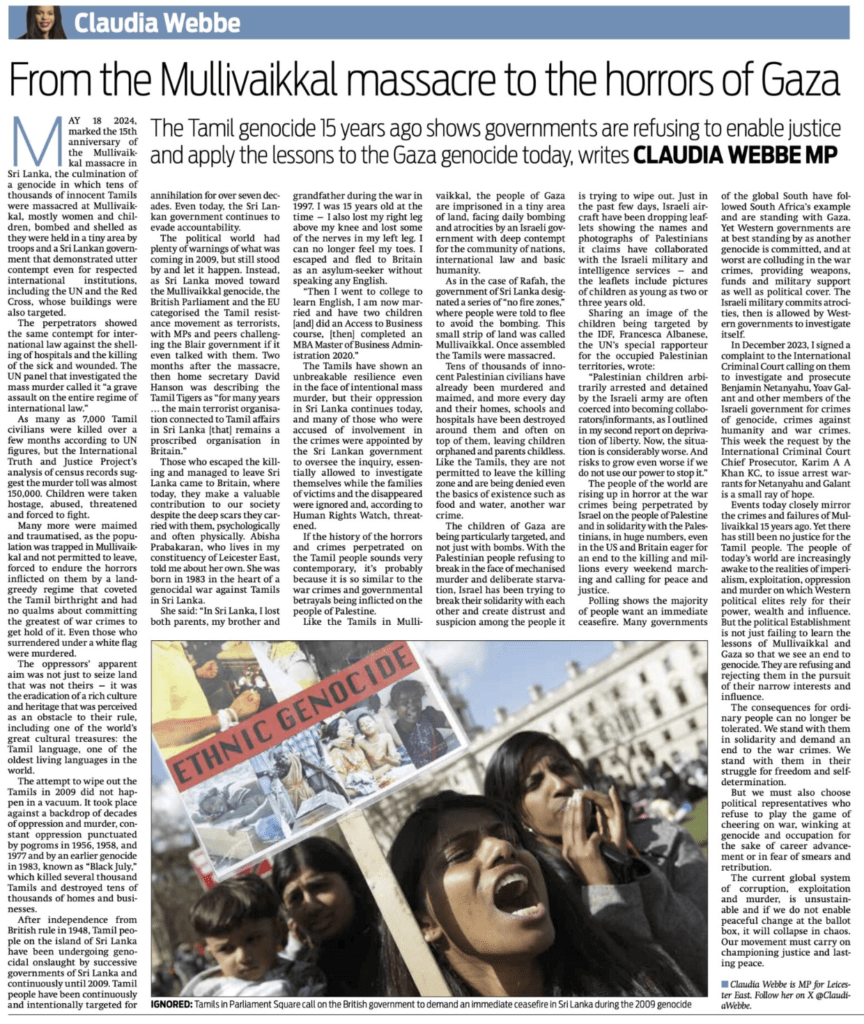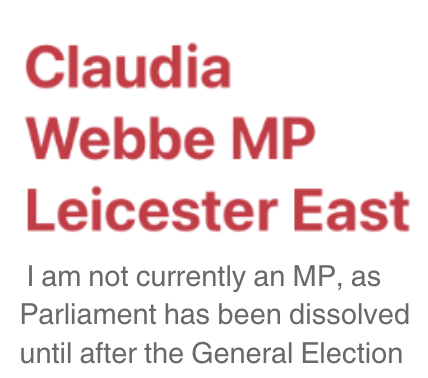
From the Mullivaikkal massacre to the horrors of Gaza
By Claudia Webbe MP
The Tamil genocide 15 years ago shows governments are refusing to enable justice and apply the lessons to the Gaza genocide today, writes CLAUDIA WEBBE MP
MAY 18 2024, marked the 15th anniversary of the Mullivaikkal massacre in Sri Lanka, the culmination of a genocide in which tens of thousands of innocent Tamils were massacred at Mullivaikkal, mostly women and children, bombed and shelled as they were held in a tiny area by troops and a Sri Lankan government that demonstrated utter contempt even for respected international institutions, including the UN and the Red Cross, whose buildings were also targeted.
The perpetrators showed the same contempt for international law against the shelling of hospitals and the killing of the sick and wounded. The UN panel that investigated the mass murder called it “a grave assault on the entire regime of international law.”
As many as 70,000 Tamil civilians were killed over a few months according to UN figures, but the International Truth and Justice Project’s analysis of census records suggest the murder toll was almost 150,000. Children were taken hostage, abused, threatened and forced to fight.
Many more were maimed and traumatised, as the population was trapped in Mullivaikkal and not permitted to leave, forced to endure the horrors inflicted on them by a land-greedy regime that coveted the Tamil birthright and had no qualms about committing the greatest of war crimes to get hold of it. Even those who surrendered under a white flag were murdered.
The oppressors’ apparent aim was not just to seize land that was not theirs — it was the eradication of a rich culture and heritage that was perceived as an obstacle to their rule, including one of the world’s great cultural treasures: the Tamil language, one of the oldest living languages in the world.
The attempt to wipe out the Tamils in 2009 did not happen in a vacuum. It took place against a backdrop of decades of oppression and murder, constant oppression punctuated by pogroms in 1956, 1958, and 1977 and by an earlier genocide in 1983, known as “Black July,” which killed several thousand Tamils and destroyed tens of thousands of homes and businesses.
After independence from British rule in 1948, Tamil people on the island of Sri Lanka have been undergoing genocidal onslaught by successive governments of Sri Lanka and continuously until 2009. Tamil people have been continuously and intentionally targeted for annihilation for over seven decades. Even today, the Sri Lankan government continues to evade accountability.
The political world had plenty of warnings of what was coming in 2009, but still stood by and let it happen. Instead, as Sri Lanka moved toward the Mullivaikkal genocide, the British Parliament and the EU categorised the Tamil resistance movement as terrorists, with MPs and peers challenging the Blair government if it even talked with them. Two months after the massacre, then home secretary David Hanson was describing the Tamil Tigers as “for many years … the main terrorist organisation connected to Tamil affairs in Sri Lanka [that] remains a proscribed organisation in Britain.”
Those who escaped the killing and managed to leave Sri Lanka came to Britain, where today, they make a valuable contribution to our society despite the deep scars they carried with them, psychologically and often physically. Abisha Prabakaran, who lives in my constituency of Leicester East, told me about her own. She was born in 1983 in the heart of a genocidal war against Tamils in Sri Lanka.
She said: “In Sri Lanka, I lost both parents, my brother and grandfather during the war in 1997. I was 15 years old at the time — I also lost my right leg above my knee and lost some of the nerves in my left leg. I can no longer feel my toes. I escaped and fled to Britain as an asylum-seeker without speaking any English.
“Then I went to college to learn English, I am now married and have two children [and] did an Access to Business course, [then] completed an MBA Master of Business Administration 2020.”
The Tamils have shown an unbreakable resilience even in the face of intentional mass murder, but their oppression in Sri Lanka continues today, and many of those who were accused of involvement in the crimes were appointed by the Sri Lankan government to oversee the inquiry, essentially allowed to investigate themselves while the families of victims and the disappeared were ignored and, according to Human Rights Watch, threatened.
If the history of the horrors and crimes perpetrated on the Tamil people sounds very contemporary, it’s probably because it is so similar to the war crimes and governmental betrayals being inflicted on the people of Palestine.
Like the Tamils in Mullivaikkal, the people of Gaza are imprisoned in a tiny area of land, facing daily bombing and atrocities by an Israeli government with deep contempt for the community of nations, international law and basic humanity.
As in the case of Rafah, the government of Sri Lanka designated a series of “no fire zones,” where people were told to flee to avoid the bombing. This small strip of land was called Mullivaikkal. Once assembled the Tamils were massacred.
Tens of thousands of innocent Palestinian civilians have already been murdered and maimed, and more every day and their homes, schools and hospitals have been destroyed around them and often on top of them, leaving children orphaned and parents childless. Like the Tamils, they are not permitted to leave the killing zone and are being denied even the basics of existence such as food and water, another war crime.
The children of Gaza are being particularly targeted, and not just with bombs. With the Palestinian people refusing to break in the face of mechanised murder and deliberate starvation, Israel has been trying to break their solidarity with each other and create distrust and suspicion among the people it is trying to wipe out.
Just in the past few days, Israeli aircraft have been dropping leaflets showing the names and photographs of Palestinians it claims have collaborated with the Israeli military and intelligence services — and the leaflets include pictures of children as young as two or three years old.
Sharing an image of the children being targeted by the IDF, Francesca Albanese, the UN’s special rapporteur for the occupied Palestinian territories, wrote:
“Palestinian children arbitrarily arrested and detained by the Israeli army are often coerced into becoming collaborators/informants, as I outlined in my second report on deprivation of liberty. Now, the situation is considerably worse. And risks to grow even worse if we do not use our power to stop it.”
The people of the world are rising up in horror at the war crimes being perpetrated by Israel on the people of Palestine and in solidarity with the Palestinians, in huge numbers, even in the US and Britain eager for an end to the killing and millions every weekend marching and calling for peace and justice.
Polling shows the majority of people want an immediate ceasefire. Many governments of the global South have followed South Africa’s example and are standing with Gaza. Yet Western governments are at best standing by as another genocide is committed, and at worst are colluding in the war crimes, providing weapons, funds and military support as well as political cover. The Israeli military commits atrocities, then is allowed by Western governments to investigate itself.
In December 2023, I signed a complaint to the International Criminal Court calling on them to investigate and prosecute Benjamin Netanyahu, Yoav Galant and other members of the Israeli government for crimes of genocide, crimes against humanity and war crimes. This week the request by the International Criminal Court Chief Prosecutor, Karim A A Khan KC, to issue arrest warrants for Netanyahu and Galant is a small ray of hope.
Events today closely mirror the crimes and failures of Mullivaikkal 15 years ago. Yet there has still been no justice for the Tamil people. The people of today’s world are increasingly awake to the realities of imperialism, exploitation, oppression and murder on which Western political elites rely for their power, wealth and influence. But the political Establishment is not just failing to learn the lessons of Mullivaikkal and Gaza so that we see an end to genocide. They are refusing and rejecting them in the pursuit of their narrow interests and influence.
The consequences for ordinary people can no longer be tolerated. We stand with them in solidarity and demand an end to the war crimes. We stand with them in their struggle for freedom and self-determination.
But we must also choose political representatives who refuse to play the game of cheering on war, winking at genocide and occupation for the sake of career advancement or in fear of smears and retribution.
The current global system of corruption, exploitation and murder, is unsustainable and if we do not enable peaceful change at the ballot box, it will collapse in chaos. Our movement must carry on championing justice and lasting peace.
Claudia Webbe MP is the member of Parliament for Leicester East. You can follow her at www.facebook.com/claudiaforLE and twitter.com/ClaudiaWebbe


